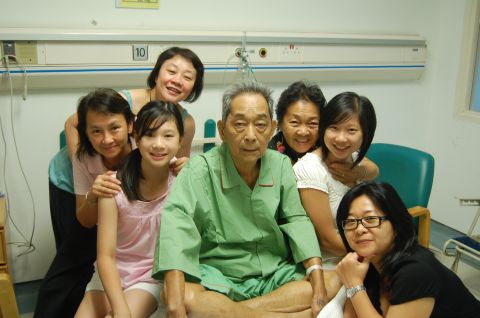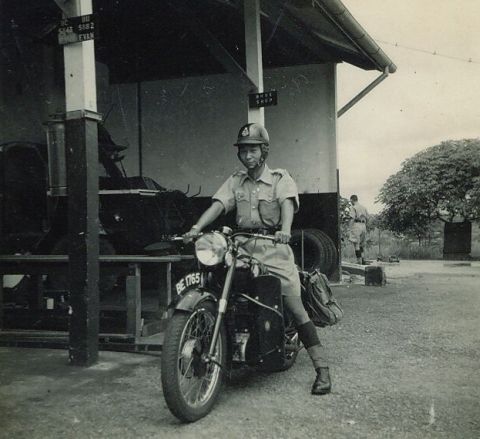A COUPLE of weeks ago, I listened to my grandfather’s life story for the first time.
Now I know a lot of people aren’t really into “grandfather stories”, but if they had listened to one the way I had to, maybe they’d think differently.
Over the last couple of months, the Selayang Hospital in Selangor has been like my second home.
It’s not much of a home, really. The hallways feel cold and uninviting, the air smells sterile and the people look mostly miserable.
But that’s where Yee Yook Son, my grandfather, would have to spend his last days struggling with leukaemia, and where I would finally hear the remarkable story of his life.
I don’t think it was the ideal way to have heard it, being stuck in a hospital ward.
My extended family worked together to make sure someone was by his side 24/7, especially at night when one of us would sleep over on this rickety steel deck chair the hospital provided. He was too weak to be alone, but that wasn’t why we were there. He had always been an incredibly kind, selfless person. We all owed so much to him, and we wanted to be with him.

Some of my aunts and nieces spending time with my grandfather at the hospital. All of us visited him almost every day.
We made it a habit of bringing his favourite food every day. One night he was in the mood for thosai, so I brought some after work with some teh tarik.
Eating at that unhomely ward with my brother and aunt somehow got his spirits up, so my brother Elroi (yes, that’s a real name) got him talking about what life was like when he was younger.
As he shared things like where he grew up and when he got married, he started to recall the terrible period during the Malayan Emergency.
Both his parents were betrayed and killed by communists when he was a teenager, and when he had his own family, it was a constant struggle just to put food on the table.
He had a job as a police officer and still remembers that it paid exactly RM141.70 a month, a small amount even back then, and he had 10 children and several relatives to care for.

My grandfather used to work for the police, and the pay was always just enough for him and his family to get by.
“It is a terrible thing to have to live during a war,” he said.
But then he told us a story that would leave an indelible mark on me.
Many years ago, he walked past a toy shop with his eldest son, my father, still a little boy at the time. Naturally, my father stopped to have a look. But my grandfather, knowing he couldn’t afford it, had to say no to his son, who started to cry and refused to leave.
At that point in the story of his life, my grandfather broke down in tears.
“It was only one or two ringgit, but I just couldn’t buy it for him,” he said as a pained expression took over his face and the tears rolled down.
He had survived the death of his parents and an entire war, but it was the memory of not being able to give his son some of the joys of childhood that really broke his heart.
Not long after that story, he started to feel tired. I took the chance to tell him just before he slept that everything we had as a family we owed to him, that we all loved him, and for that, he should have no regrets.
That turned out to be the last conversation we had.
He was too weak to talk during my next two visits, and there was a stretch of three days when I couldn’t visit due to work. I promised myself once I returned from an assignment in Penang, I would go straight to the hospital with a packet of the nasi beriyani he had been craving for.
Early one morning in Penang, around 7.30am, I got a phone call from an aunt, who was in tears. He had just passed away.
He had told my father he didn’t want a funeral. He didn’t want us to make a big fuss out of it and “mah fan” (inconvenience) others who’d have to attend. He just wanted to be cremated, and have his ashes thrown into a river.
And because he wouldn’t have a tombstone to bear his final words to his family, he wrote them on a piece of paper for us.
Written in Chinese verse, the first part said: “No matter how strong the love between father and child, husband and wife, there comes a time to part”. He was a traditional Chinese father, and that was his way of telling his family he loved them, without having to actually say it.
The second part can be summed up as: “A sum of a life should be in hard work, and a family in togetherness”.
Together, as a grieving but happy family, we all gave grandad the grand funeral he didn’t want, but completely deserved. That was the Sunday before last.
Sometimes after work, I still find myself making plans to go to the hospital, to sleep on that deck chair again, to listen to his stories, or bring him nasi beriyani. But then I realise there’s just nothing there anymore.
All that’s left is the memory of his story, a memory which I fear will fade over time. That’s why I’ve written it down here, so that my grandfather’s story, his remarkable life, will live on forever.

Tell us what you think!